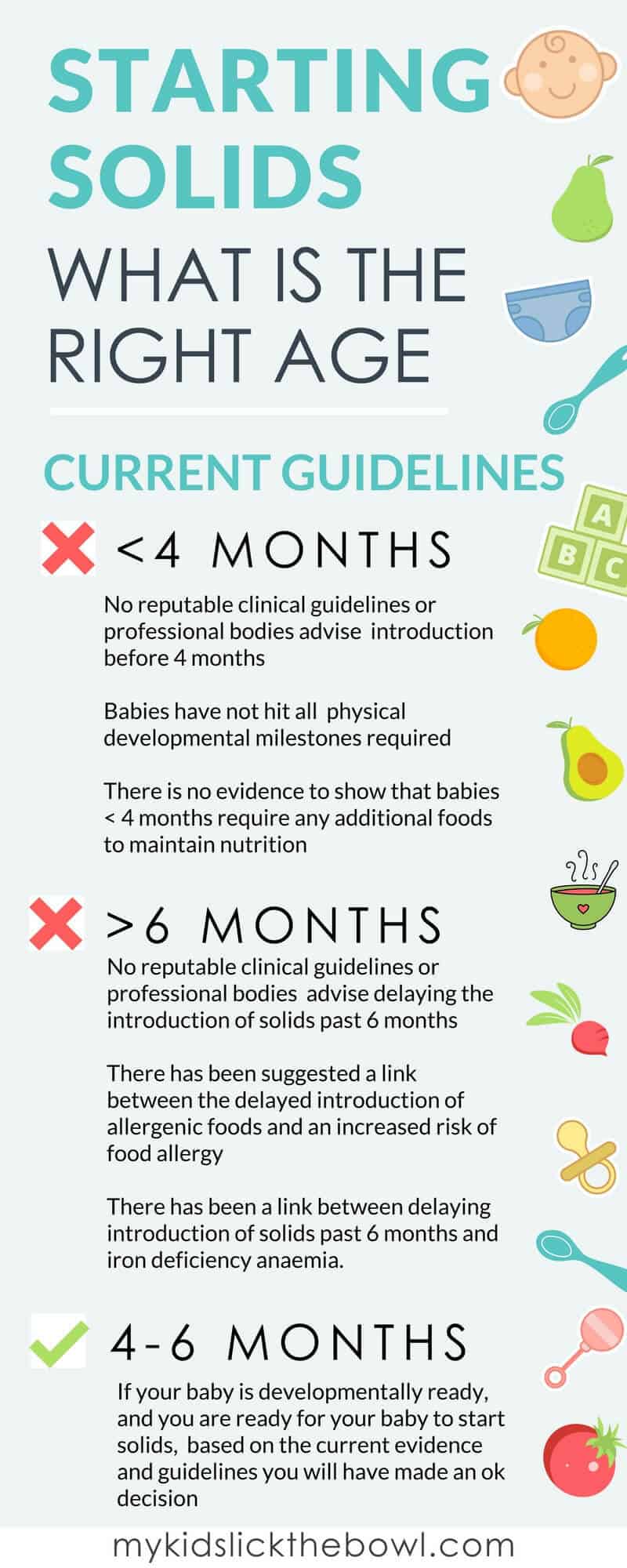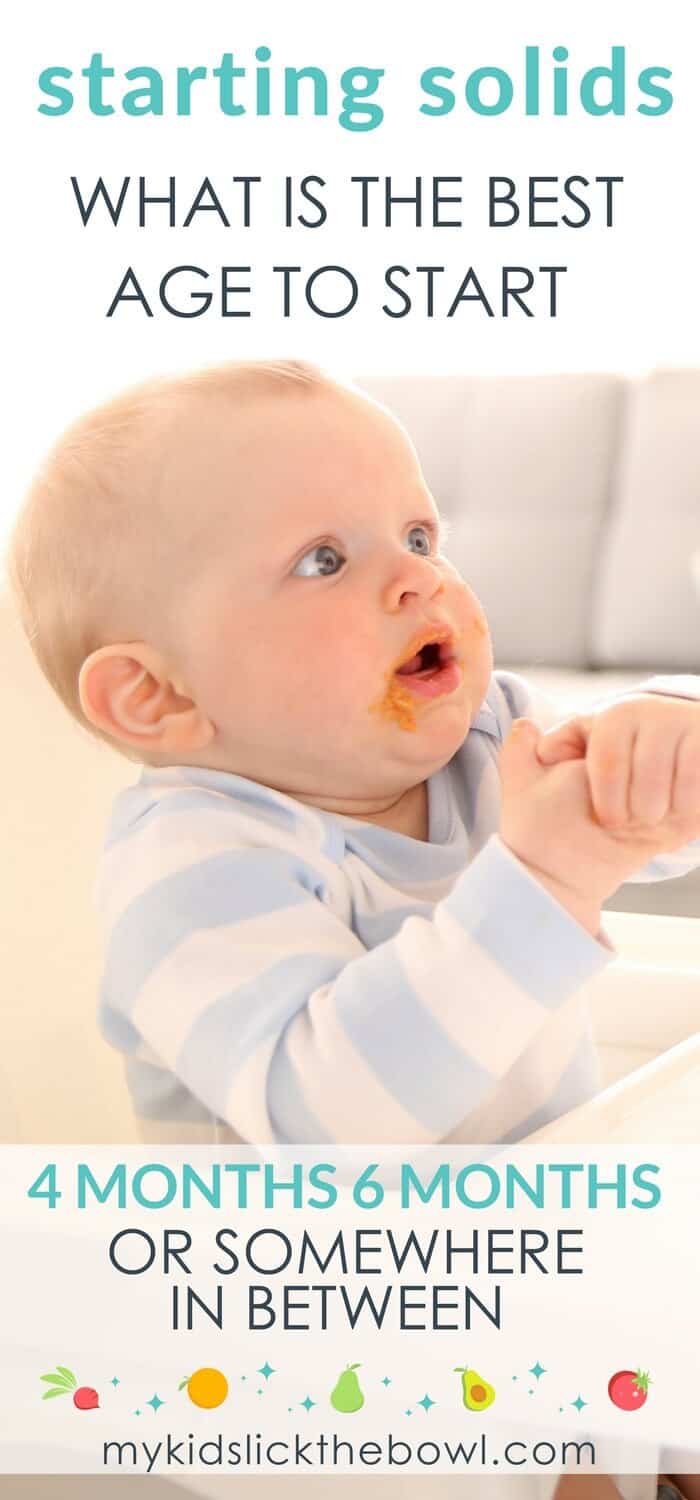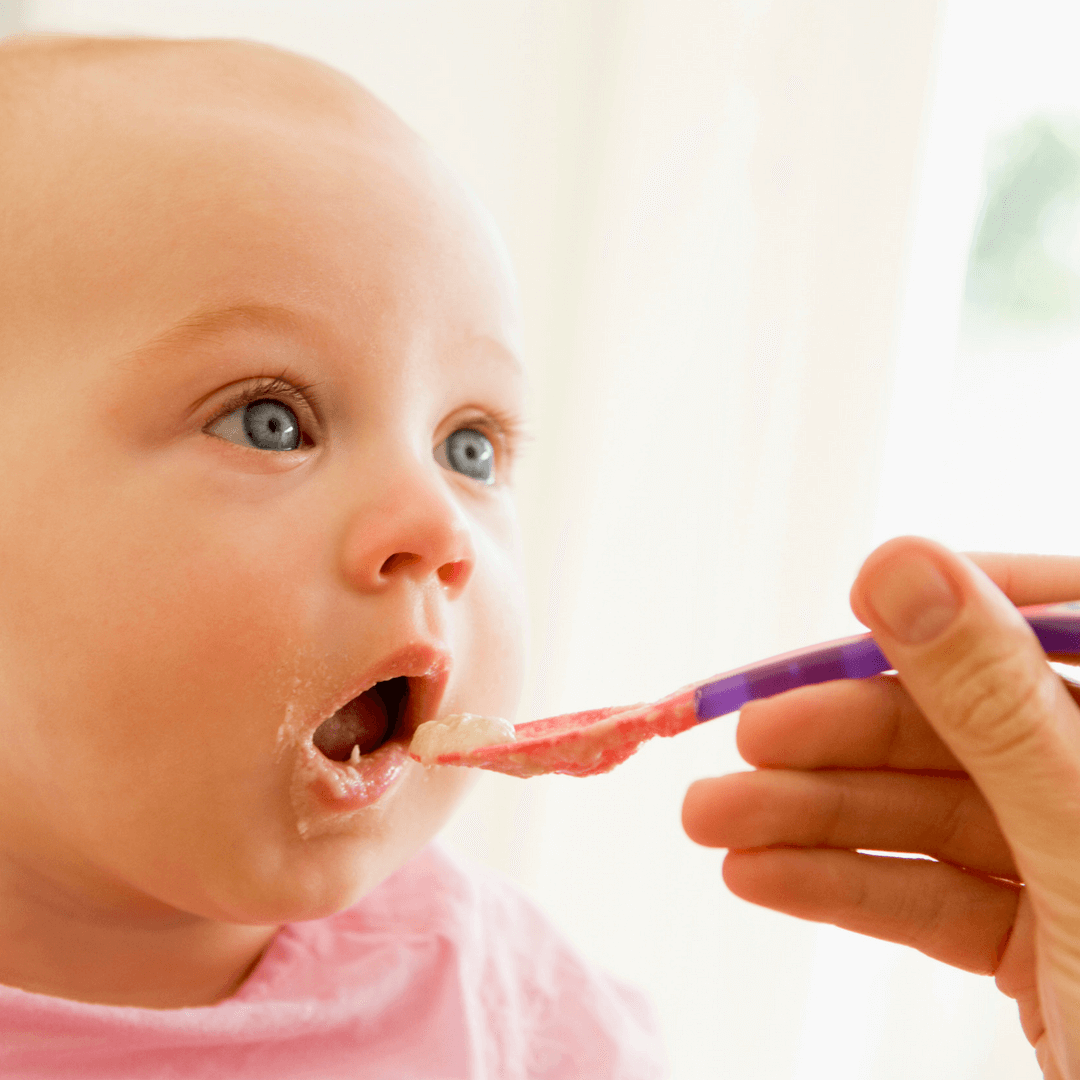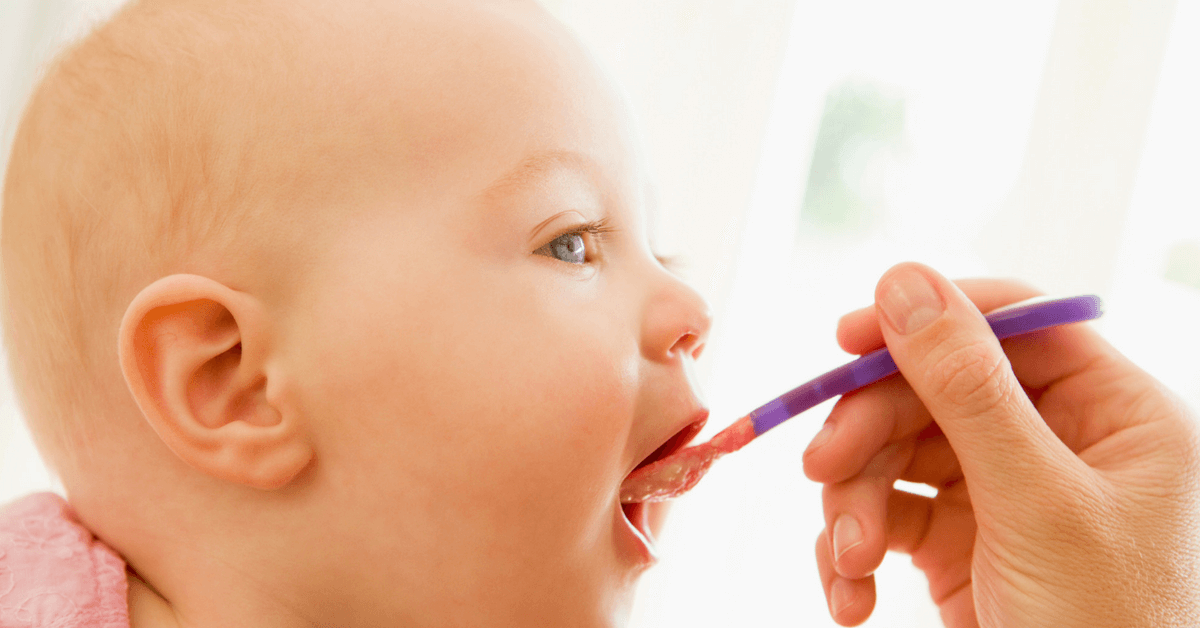Solids: When is the right time to start?
When is the right age to start solids?
Starting babies on solids is a huge and exciting step for any parent, me included. But when is the right time to start? There seems to be a little bit of conflicting information out there.
As a mum with a background in human nutrition I thought I would update myself and do some reading on the topic.
This article will take you through some of the background, facts and clinical evidence around when babies should start solids. So that as a parent you can make your own informed decision.
First things first: Your baby has to be physically ready to start solids
Head and neck control
To be able to take solids safely babies need to have good head and neck control. They need to be able to sit upright while supported.
I have read on some fact sheets where they suggest baby needs to be able to sit unsupported or independently. To the best of my knowledge, this is not the case.
However, your baby does need to be able to hold their head in a stable position while being supported either by a parent, high chair or similar baby seat. If your baby does not have good head and neck control then they are simply not ready to start solids.
Tongue thrusting reflex
This reflex is also called the extrusion reflex. Essentially this is a reflex where the baby sticks its tongue out/forward when its lips are touched or food is placed in its mouth.
A baby who still has the tongue-thrust reflex cannot move food to the back of its mouth to swallow it, instead, all offered food will be pushed out the front.
Some people take this as a sign that baby doesn't like the food they are being offered, i.e. the baby is spitting it out. This is not the case.
If you offer your baby solids and it all just comes out the front and it is not swallowed, this is a sign your baby is simply not quite ready for solids. You will need to try again in a few weeks time.
Curiosity
Babies who are ready for solids typically become interested in people eating.
Personally, I wouldn't rely on curiosity as a sole indicator that they are ready to start solids. My babies watch everything I do with curiosity, but this doesn't mean they are ready to start cooking dinner, drive the car or use sharp scissors.
However, it is a useful indicator alongside having good head and neck control and having lost the tongue thrust reflex.
Teeth
No teeth are required to start solids. Gummy sharks make excellent eaters. My second child did not get her first tooth until 13 months old, but you would be amazed at what she could eat with no teeth what so ever.
She is currently 18 months old and sports a grand total of 4 teeth, she's not letting that slow her down though.
Starting Solids: What do the current guidelines and professional organisations say?
I have summarised the current guidelines in this infographic. But if you are after a further breakdown, and more detail, that is right below as well.

World Health Organisation
The World Health Organisation (WHO) currently recommends babies remain exclusively breastfed until 6 months of age, with the "introduction of nutritionally adequate and safe complementary foods (solids) at 6 months." This recommendation was made in 2001 upon the publication of an expert consultation document.
New Zealand and Australian Guidelines
The current New Zealand and Australian food and nutrition guidelines for healthy infants and toddlers (0-2yrs) give the following recommendation: "Complementary foods can be introduced around 6 months of age"
This recommendation was published in 2008. This is a slight softening of the previous guideline which was in line with the WHO of "at 6 months."
European Society for Paediatric Gastroenterology, Hepatology and Nutrition
ESPGHAN published a medical position paper on complementary feeding in 2017 that made the following statements
- Exclusive or full breast-feeding should be promoted for at least 4 months (17 weeks, beginning of the 5th month of life) and exclusive or predominant breast-feeding for approximately 6 months is considered a desirable goal.
- "Complementary foods (ie, solid foods and liquids other than breast milk or infant formula) should not be introduced before 4 months but should not be delayed beyond 6 months.
European Food Safety Authority
ESFA published a scientific opinion on the appropriate age for introduction of complementary feeding of infants in 2009 (Find it here).
This review focussed predominately on breastfed infants and the data used was sourced from studies in developed countries. They concluded:
- Exclusive breastfeeding provides adequate nutrition for most infants up to the age of six months
- Introduction of complementary food into the diet of healthy term infants in the EU between the age of 4 and 6 months is safe and does not pose any adverse health effects.
- Some infants may need complementary foods before 6 months (but not before 4 months) in addition to breastfeeding to support optimal growth and development. (Iron and Zinc were the nutrients that stated may not be entirely met by all babies who were exclusively breastfed.
American Academy of Paediatrics
The AAP published a policy statement on breastfeeding in 2012 (Find it here), Recommending "exclusive breastfeeding for about 6 months". Which is in line with the current ANZ guidelines.
Australasian Society of Clinical Immunology and Allergy
ASCIA published advice on infant feeding and allergy prevention in children in 2010 (Find it here). Key points they made on the introduction of solids
- "Many experts across Europe, Australia and North America recommend introducing complementary solid foods from around 4-6 months"
- "There is little evidence that delaying the introduction of complementary solid foods beyond 6 months reduces the risk of allergy"
- "There is insufficient evidence to support previous advice to specifically delay or avoid potentially allergenic foods (such as egg, peanuts, wheat cow's milk and fish) for the prevention of food allergy or eczema."
Save This Recipe!
American Academy of Allergy, Asthma and Immunology
The AAAI 2013 recommendations state complementary foods can be introduced between 4 and 6 months of age.
European Academy of Allergy and Clinical Immunology
EAACI 2014 guideline for the primary prevention of food allergy, states "there is no evidence to avoid introducing complementary foods beyond 4 months of life and currently the evidence does not justify recommendations about either withholding or encouraging exposure to potentially allergenic foods after 4 months once weaning has commenced"
To summarise
- None of the guidelines or professional organisations recommend commencing solids/complementary foods before 4 months/17 weeks
- None of the guidelines or professional organisations recommend delaying the introduction of solids/complementary food after 6 months
- It's a mixed bag as to whether guidelines or professional organisations recommend commencing solids/complementary foods between 4-6 months or at 6 months.
- Guidelines written by professional groups with an allergy focus recommend introducing complementary foods/solids between 4 and 6 months
My opinions, thoughts and musings on starting solids and the current guidelines
WHO makes a change and everyone follows
In 2001 The WHO changed its recommendation on the timing of solids introduction from between 4-6 months to at 6 months.
The WHO made this change in an effort to combat the growth faltering frequently seen in babies of developing countries at about 3 months of age.
It is thought to be in part due to the poor nutritional adequacy of the complementary foods/solids given to babies in these countries.
After an extensive research review (available here) The experts found exclusive breastfeeding for 6 months vs 3-4 months:
- reduces gastrointestinal infection
- does not impair growth
- helps mum lose weight
- delays the return of menstruation (i.e. a form of contraception)
As the review found no negative outcomes related to recommending 6 months vs 3-4 months of exclusive breastfeeding, and there were potentially huge gains to be made for the health of babies in developing countries the WHO recommendations were changed.
From here many countries including Australia and New Zealand updated their guidelines to be in line with the WHO and began recommending exclusive breastfeeding, delaying the introductions of solids/complementary foods until 6 months of age.
Food allergy rates rise
Food allergy rates within New Zealand, Australia and other developed countries appear to have been rising over the past decade. The timing of solids introduction is one area which is being investigated as a potential cause of this increase.
For some time it was believed avoidance of allergenic foods for up to one year of age was the best way to prevent children developing a food allergy.
Pregnant mothers were advised to avoid allergenic foods such as peanuts during pregnancy and lactation, and it was typically advised to delay the introduction of solids and potentially allergenic foods to beyond six months. (or in some cases longer).
It is hypothesised that these measures may well have contributed to the rise in allergy rates that we are seeing.
The recommendation of allergenic food avoidance and delaying of solids introduction has since been dropped by professional bodies in Europe, America, Australasia.
Research has found delaying exposure to allergenic foods past 6 months does not offer protection against developing a food allergy, even in high-risk children. There may, infact be a 'protective window' for the introduction of allergenic foods between 4 and 6 months.
Not all studies have concluded that there is a benefit of introducing allergenic foods between 4 and 6 months versus at 6 months, but they have also not found any negative effects of starting children on complementary foods between 4 and 6 months.
Currently, the three allergy professional bodies covering Europe, America and Australasia state the introducing complementary foods between 4 and 6 months including potentially allergenic foods is safe.
So where does this leave me when will I introduce solids to my baby?
I am currently exclusively breastfeeding a 13 week old girl. I live in New Zealand which is a developed country and I have access to safe, nutritionally sound complementary foods.
I have access to medical contraception and my baby has access to a great health care system.
Not before 4 months
- None of the reputable clinical guidelines or professional bodies I reviewed above advise the introduction of before 4 months
- Before 4 months some babies have not hit all the physical developmental milestones required to start solids
- There is no evidence to show that babies under the age of 4 months require any additional foods to maintain their nutritional status.
- Some additional studies I read found there may be some negative consequences to introducing solids before 3-4 months. Including increased chance of:
- Type 1 diabetes
- Coeliac disease
- Increased childhood body weight
- Childhood eczema
Not after 6 months
- As I've summarised above, none of the reputable clinical guidelines or professional bodies I reviewed above advised delaying the introduction of solids past 6 months
- There has been suggested a link between the delayed introduction of allergenic foods and an increased risk of food allergy
- There has been a link between delaying introduction of solids past 6 months and iron deficiency anaemia.
Somewhere in between?
It would seem that as I am lucky enough to be raising my baby in the great developed nation of New Zealand then I probably can't go too wrong if I choose to start my baby on solids sometime after they are four months old but not delayed any longer than the time they hit six months
Starting solids is an important parenting milestone, but I would say, we can probably all relax and not worry too much.
If you are ready for your baby to start solids, your baby is developmentally ready and it is after they are four months but no later than 6 months then based on the current evidence and guidelines you will have made an ok decision,
In this article I have attempted to answer the WHEN and WHY part of the solids question, or at least provide information so that you as a parent can make your own informed decision, There are a few more aspects to starting solids.
If you are deciding whether to go down the Traditional Spoon Feeding Route or Baby Led Weaning, then check out my article on this as well.
Starting Solids: Traditional Approach vs. Baby Led Weaning




Quick Start Guide To BLW
Baby led weaning doesn’t need to be complicated, grab my quick start guide to begin your little ones food journey.